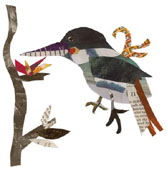“Completely out of the blue comes an extraordinary little CD, so powerful in its minute way, hugely evocative and humane. The clues to what's going on are in the photos-a living room recording set up with Mr. Appelqvist marshalling apparently amateur singers. He plays the piano and a few other things, talks to the singers and they sing. It is the intimacy of it that is most compelling, so intense that it is almost unbearable but beautiful and joyous in such an honest and direct way that is truly unique. Only a few of the Songs in the Key of Z come close and none have this fragility or fluidity. Zenna and Marie are the two little girls on the first track, they sing a song in Swedish chat and then "Be What You Wanna Be" in English. They don't seem to know all the words, loose their way, mumble some lines but no matter-they come back to the chorus with enthusiasm and unaffected positivity that only the Langly Schools Music Project can touch. Appelqvist's lively playing is deft and idiosyncratic with a delightful light touch that adds much musicality without moving beyond the role of accompaniment. The directness and total absence of artifice carries over to the sound quality, which is simply brilliant. It puts you right there in that mundane living room with these wonderful people to positively eerie effect, as though you were invading someone's privacy. Xiang, more grown up and probably Chinese, sings on track two. She expresses the self-consciousness that comes after childhood and before actual maturity. Ruth, older again, is soloist on track three. Her song, "Geh aus, mein Herz," is given a strangely menacing backdrop with a few heavy guitar chords and ethereal flutes. She sings with the confidence of someone who has been through motherhood and long since sent her children off into the world. She seems to treat Appelqvist's project with the indulgence she would give to her grandchildren's antics. One could perhaps say that this disk is about language, how it affects music, how song, intonation and melody adapt to it. The girls sound so different in English from Swedish, Xiang shows that the melody of Chinese is inescapable, and Ruth's song in German shows the strictness of that language and how uncomfortable it is with melody. Interesting as this thought may be, the real stuff here is in the emotion and how we lose so much of that with all the manufacturing involved in the other music we hear.”
Tom Worster, Brainwashed
“Att Möta Verkligheten is a new release from the Häpna label, and from Swedish artist Hans Appelqvist. These three tracks combine a very informal style of music with voices, conversations, monologues. Each track features one or two voices: two young girls in the first track, a young woman in the second, and older woman in the third. The voices and the songs are in Swedish, English, Chinese and German, and the music is mostly performed on piano, mandolin, flute and percussion. Appelqvist combines music with text in a very natural, informal way; the voices are speaking openly, and they are probably singing songs that are meaningful to them, perhaps even chosen for these meanings. The music too, surfaces suddenly, informally, as if in an improvised session, a small, spontaneous living room recording, but we also have the impression that all of these elements have been arranged after the fact, with careful precision. Not having the benefit of understanding very much Swedish, Chinese or German, the words are mostly lost on me, and I have had to fall back on other impressions in addition to my imagination, to the arrangements themselves, their tone and structure. Listening, you can feel the stories passing through you, from one age to the next, from one language to the next. These are all individual (female) voices, and there is something sad here, lurking just beneath the surface (the weight of life, history, the stories of the past), but there's also a great joy, inherent in the innocence of children, the melodies of song, the delicate instrumentation, a celebration of life, of the very joy of music, of the singer and the song. Filled with inspiration and insight, this is living music.”
Richard di Santo, incursion.org
“Best Swedish EP 2003”
Andres Lokko, Expressen




